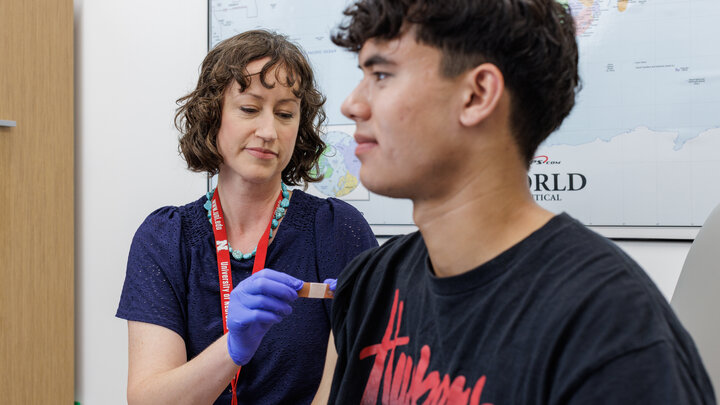With less sunlight and colder weather, you might feel shifts in mood, energy and motivation. These changes are common and could signal seasonal affective disorder, or SAD.
What is SAD?
SAD is a form of depression that typically occurs in fall and winter. Reduced sunlight during these months can disrupt your internal clock, affecting sleep, energy and mood. Add colder weather, finals and holiday stress, and it’s no wonder these months feel tougher.
“Symptoms of SAD can include fatigue, low motivation, feelings of sadness or disinterest in activities you usually enjoy, increased sleep or difficulty waking up and trouble concentrating,” says University Health Center psychiatrist Stephanie Sutton, MD.
Tools for coping with SAD
- Stick to a routine: Keep a consistent sleep schedule to help get a full night’s rest and avoid staying up too late.
- Get moving: Regular physical activity, like brisk walking or hitting the gym, can elevate your mood.
- Embrace the outdoors: Bundle up and spend time outside daily. Even short walks can expose you to natural light.
- Consider light therapy: A light therapy lamp in the mornings can help if you’re prone to lower energy during fall and winter.
- Stay organized: Tackle assignments early to avoid stress piling up.
- Get involved: Join campus groups or activities to stay socially connected.
Self-care that works year-round
Adopting habits that support your mental health can ease SAD symptoms and benefit you year-round:
- Find a balance between work, school and relaxation.
- Limit screen time and engage in hobbies or activities you enjoy.
- Lean on your support network – spend time with friends or loved ones.
- Practice healthy coping strategies, like mindfulness or journaling, when feeling stressed.
Support is available
Feeling the seasonal shift is normal, but you don’t have to navigate it alone. If you’re feeling overwhelmed, reach out. The University Health Center and Counseling and Psychological Services (CAPS) are here to support you. Whether you need someone to talk to or guidance on managing SAD, help is just a click away.




